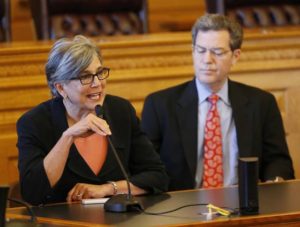
Senate President Susan Wagle with Governor Brownback
The Senate Select Committee on Education Finance has been holding committee meetings lately to talk about what the House has done so far on an education finance bill. The House bill, Sub for HB 2410, is sitting in limbo, not yet scheduled for debate on the House floor so, in reality, the final House bill is not done. When it does finally reach the floor it will be subject to amendments and most people feel that it very likely to be amended.
So we found it interesting that the Senate Committee, chaired by Sen. Jim Denning (R-Shawnee), scheduled hearings on Sub for HB 2410 starting today. This left many of us in a bit of confusion. Denning has been announcing his ideas on school finance – or at least on adjustments to HB 2410 – that will make up a Senate position.
While we (KNEA) wrote our testimony purely on HB 2410 as it came out of the House Committee, we did get a quick look at Denning’s bill (SB 251) and listened to the revisor’s explanation which allowed us to speak to the differences between it and HB 2410.
Senate Bill 251 started with the House bill and made a few adjustments.
- They kept the at-risk weighting at the lower weight (.454) instead of the .481 in the House bill (KNEA supports the House position),
- keep the first year base foundation aid at $4006 but then apply a formula to determine the second year based roughly on the successful schools model used in a prior study and set the second year base at $4080 (KNEA believes the original House version prior to the Monday changes is the best of the options proposed),
- beginning in the third year they propose a formula to raise base funding through a rolling 3-year average of the CPI-U rather than the actual CPI-U as in the House version (KNEA supports an inflation measure going forward and will have to study this proposal more closely),
- eliminate the mandate for ABA therapy for children with autism (KNEA supports the Senate position), and
- eliminate the local enhancement fund for schools with the least at-risk students (KNEA supports the Senate position).
Both bills provide for all-day kindergarten, mentor teacher program funding, and professional development funding (KNEA supports all three).
What might be Denning’s most troubling idea is to fund schools through a surcharge on utilities. He proposes putting a $2.25/month charge on all three residential utility bills (gas, electric, and water) and a $10/month charge on those bills for businesses. Every Kansan would pay an additional $6.75/month for utilities to fund a school finance increase. There are other parts to this as well such as a $120 annual charge on farmers who irrigate.
This proposal has already come under widespread disapproval as regressive and unfair. It’s hard to see much support for the idea in either chamber.
Testifying on the bill today were Olathe Schools, City of Olathe, Pratt Schools, Bonner Springs Schools, KASB, Insight Virtual Schools, The Alliance for Childhood Education, Kansas Policy Institute, and of course KNEA.
The hearing will continue tomorrow morning. All testimony is expected to be finished tomorrow and Chairman Denning suggested he might begin working the bill tomorrow. He has also suggested that they may work on Saturday.
No Agreement on Taxes
The Tax Conference Committee met this evening we had hoped that they would produce an agreement on the House proposal to simply repeal the 2012 Brownback tax disaster.
At issue was which chamber would run the proposal first. When the Senate conferees said they would not entertain the idea of both chambers running it simultaneously, the conference committee ended without agreement.
And so we go back to waiting. We’ll see what shakes out tomorrow.


